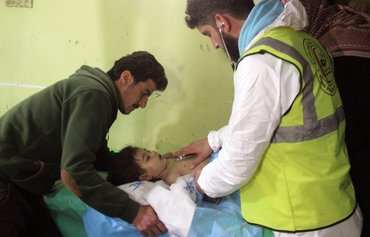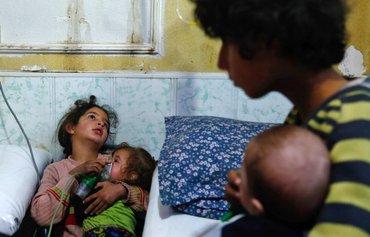UNITED NATIONS -- US envoy to the United Nations Linda Thomas-Greenfield on Thursday (March 4) accused Russia of seeking to stymie efforts to hold the regime of Syrian President Bashar al-Assad accountable for its use of chemical weapons.
"We all know the al-Assad regime has repeatedly used chemical weapons. So why hasn't the Syrian government been held accountable?" she said at a UN Security Council meeting via videoconference.
"The answer is sadly simple: the al-Assad regime has tried to avoid accountability by obstructing independent investigations and undermining the role and work" of the Organisation for the Prohibition of Chemical Weapons (OPCW), she said.
"And the regime's allies, in particular Russia, have also sought to block all efforts to pursue accountability," she added.
![A picture taken April 4, 2017, shows destruction at a hospital room in Khan Sheikhun, Idlib province, following a suspected toxic gas attack. [Omar Haj Kadour/AFP]](/cnmi_am/images/2021/03/05/28759-Khan-Sheikhun-attack-600_384.jpg)
A picture taken April 4, 2017, shows destruction at a hospital room in Khan Sheikhun, Idlib province, following a suspected toxic gas attack. [Omar Haj Kadour/AFP]
![A destroyed ambulance from the Syrian Civil Defence (White Helmets) is seen in the town of Khan Sheikhun, Idlib province, on September 22, 2017, following reported Russian airstrikes. [Omar Haj Kadour/AFP]](/cnmi_am/images/2021/03/05/28760-Syria-destoyed-ambulance-600_384.jpg)
A destroyed ambulance from the Syrian Civil Defence (White Helmets) is seen in the town of Khan Sheikhun, Idlib province, on September 22, 2017, following reported Russian airstrikes. [Omar Haj Kadour/AFP]
As the key backer of the Syrian regime, Russia also is to blame for the attacks, the international community has said.
"Russia has defended the al-Assad regime despite its chemical weapons attacks, it has attacked the professional work of the OPCW, and it has undermined efforts to hold the al-Assad regime accountable for its use of chemical weapons and numerous other atrocities," Thomas-Greenfield said.
According to the UN, which has accused the Syrian regime of carrying out chemical attacks against its own citizens in the past, Damascus has for years not replied to a series of 19 questions about its weapons installations.
These installations could have been used to stock or produce chemical weapons.
OPCW investigators have accused the regime of sarin gas and chlorine attacks in Syria in 2017.
Moscow's UN envoy Vassily Nebenzia defended Damascus, while Syria's UN envoy Bassam Sabbagh refuted the US accusation.
NGOs file criminal complaint
Meanwhile, three non-governmental organisations (NGOs) on Monday filed a criminal complaint in France against the Syrian regime over chemical weapons attacks in 2013.
The attacks, carried out on the morning of August 21, 2013, in the city of Douma and Eastern Ghouta, killed hundreds of civilians, including large numbers of children, Human Rights Watch said in an analysis of the incident in September that year.
Accusing the Syrian regime of "crimes against humanity" and "war crimes", the three organisations appealed to a Paris court to use its extra-territorial powers which allow it to judge cases outside France.
The Syrian Centre for Media and Freedom of Expression (SCM), the Open Society Justice Initiative (OSJI) and the Syrian Archive filed the case.
They are hoping the court will investigate the two attacks -- carried out with sarin gas, outlawed under the international Chemicals Weapons Convention -- in which close to 1,400 people died.
The case, which is based on witness statements, photos and an analysis of the Syrian military's chain of command, should "ascertain the responsibility of those who ordered and implemented these attacks", the NGOs said.
Fighting for truth, accountability
"We believe there is strong evidence of what happened that day," SCM president Mazen Darwish said. "It's very important to send a message to the perpetrators that survivors will keep fighting for truth and accountability."
With the evidence gathered, he said, the NGOs were giving France and other governments "the key, the legal possibility to act in a political and legal way".
Failure to act on the evidence would mean "that we give the green light for all dictatorships to use chemical weapons".
Syrian Archive director Hadi al-Khatib said in the statement that the Syrian regime "has to be held responsible" for the attacks. He alleged it had failed to be transparent about its production, use and stockpiling of chemical weapons.
The NGOs said they hoped France would co-operate with prosecutors in Germany, where they had lodged a case in October concerning the alleged use of chemical weapons.
The case in Germany, the first legal action over the Syrian regime's alleged use of chemical weapons, was filed on behalf of victims of the nerve agent sarin in 2013 and 2017, according to the SCM.
After the 2013 attacks, the Syrian regime promised to dismantle its stock of chemical weapons. But according to an October report by OSJI and Syrian Archive, it is still running a "robust" chemical weapons programme.

![Medical staff at Damascus Countryside Specialised Hospital protest a chemical weapons attack on the Syrian town of Khan Sheikhun, during a gathering to show solidarity with the victims in Douma on April 6, 2017. [Sameer al-Doumy/AFP]](/cnmi_am/images/2021/03/05/28761-Doctors-chemical-protest-600_384.jpg)






